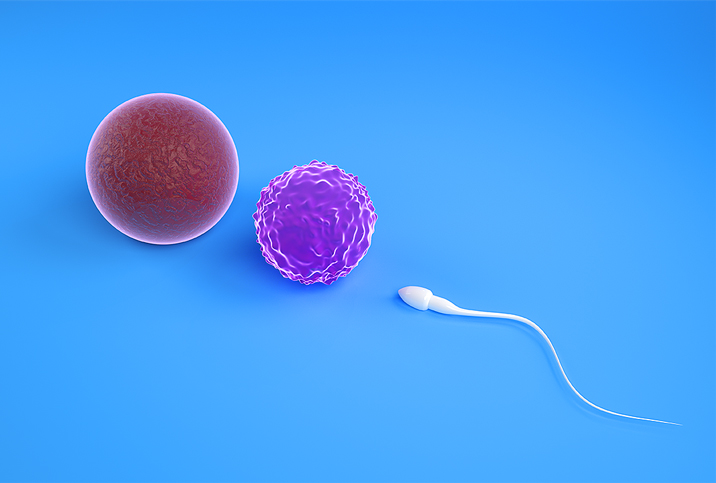What's the Worst That Can Happen If I Have Chlamydia?

Chlamydia trachomatis is a common sexually transmitted disease (STD) that often presents no symptoms, but there are consequences if left untreated, especially for fertility.
It is the most common bacterial STD in the world. In 2021 alone, more than 1.6 million cases were reported to the Centers for Disease Control and Prevention (CDC) in the United States.
"Chlamydia is typically transmitted through sexual contact, including vaginal, anal and oral sex with an infected person," said Melanie Bone M.D., a West Palm Beach, Florida-based OB-GYN and member of Daye's medical board.
Understanding the 'silent infection'
About 70 percent of women with genital chlamydia experience no symptoms, while this is less common in men, occurring in about 50 percent of cases, according to the European Centre for Disease Prevention and Control.
In fact, it's so easy to overlook, chlamydia is often nicknamed the "silent infection."
"Some people may experience mild symptoms, which can easily be confused with a urinary tract infection or a vaginal infection," said Eve Lepage, R.N., M.S.N., fertility nurse and science writer at Clue, based in Berlin, Germany. "This can make it easy for infections to go unnoticed and untreated."
The treatment is a straightforward course of antibiotics. However, it is possible to be infected with chlamydia over and over, so using barrier contraception such as condoms is recommended for prevention. Research suggests "correct and consistent" condom use can reduce the risk of chlamydia transmission by up to 60 percent.
Symptoms and testing
"If you have a new partner, have unprotected sex, pelvic pain, discharge, vaginal odor or penile discharge, those would all be reasons to initiate STI [sexually transmitted infection] testing," advised Laura Purdy, M.D., M.B.A., a board-certified family medicine physician based in Nashville, Tennessee.
These are all symptoms that could indicate a chlamydia infection:
- Bleeding after sex
- Non-menstrual bleeding
- Pain during sex (dyspareunia)
- Painful urination
- Pain or burning in the urethra
- Stomach or pelvis pain
- Testicle pain
- Unusual discharge from the penis or vagina
These are not symptoms you should ignore.
"If left untreated, chlamydia can lead to serious complications such as pelvic inflammatory disease (PID) and infertility in both sexes," Bone said.
Diagnosing chlamydia is a simple process and can be done via a swab or urine test. This can be carried out at your doctor's office, a hospital or a sexual health clinic. Alternatively, if it's more convenient, you can take the swab test at home, send it to a laboratory and receive results electronically.
The likelihood of complications
Research published in August 2012 estimated that 8 percent to 10 percent of women with chlamydia then developed PID, based on analysis of clinical reports. Those with PID can develop perihepatitis—also known as Fitz-Hugh-Curtis syndrome (FHCS)—which is the painful chronic inflammation of the liver capsule and peritoneum (the tissue surrounding your abdominal organs and abdominopelvic cavity).
More rarely, men can develop painful and swollen testicles or epididymis (the tubes that carry sperm) from untreated chlamydia. In the epididymis, this is called epididymitis and when it includes the testicles it is known as epididymo-orchitis. This condition can also be treated with antibiotics.
The serious consequences of chlamydia
"The reason that it has such severe consequences for the reproductive system is that it can create inflammation and scarring in the cervix, uterus, fallopian tubes and testicles," Bone explained.
"Sometimes it can be so severe that people need to be hospitalized, and potentially even have surgery," Purdy added.
It can lead to ectopic pregnancy (where the fertilized egg implants outside the womb), preterm labor and low infant birth weight.
Several studies have found chlamydia affects sperm function.
Another complication is sexually acquired reactive arthritis (SARA), where the joints, eyes and the urethra become inflamed. While there is no cure, many patients get better within 4 to 6 months. If it causes discomfort, it can be managed using steroids and painkillers.
Sophia Yen, M.D., M.P.H., CEO and co-founder of Pandia Health, based in Sunnyvale, California, outlined a worst-case scenario for untreated chlamydia infection.
"It blocks your tubes, and you get an ectopic pregnancy that ruptures and you die," Yen said.
However, she noted that while an ectopic pregnancy can be dangerous, it is rare and can be treated before rupture.
Chlamydia can be transmitted to a baby during delivery. In a newborn, it can cause eye infections (conjunctivitis) and pneumonia (lung infection). These require immediate treatment as infants are very vulnerable to illness just after birth. If a mother has an active infection then 30 percent to 50 percent of infants will develop neonatal conjunctivitis. In rare cases, eye infections in a newborn can lead to blindness.
Protecting your future fertility
Bone recommended getting tested for STIs prior to conception or during pregnancy—even for people in long-term relationships—to protect against complications. A doctor will prescribe antibiotics that are safe for pregnancy and breastfeeding.
Untreated chlamydia can also make you more susceptible to contracting HIV.
Yen advised getting tested for gonorrhea and syphilis at the same time as chlamydia. This is because if you're sexually active and at risk of a chlamydia infection, then you could have been exposed to other STDs.
Gonorrhea can cause similar fertility problems including PID, ectopic pregnancy, infertility, miscarriage and premature birth. Syphilis during pregnancy can lead to miscarriage, stillbirth and premature birth as well as potentially infecting the baby.
Because bacterial vaginosis and yeast infection can also cause unusual discharge, she suggested being checked for those, too.
"Early detection and treatment can help prevent complications and protect your reproductive health," Lepage said.
It is imperative to discuss any STI diagnoses with any previous and current partners so they can get tested.
While chlamydia can lead to severe complications, there are many opportunities to diagnose and treat it before it reaches a later stage.
Looking after your sexual health means protecting your fertility and reproductive system, and that of those you are sexually intimate with, as well as any future children you may have as well.


















